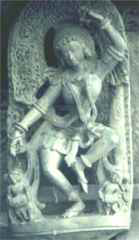
Understanding Hinduism
 Hinduism is not a closed system of beliefs and practices observed by all Hindus. It is rather an extremely complex assortment of beliefs and practices bound together by their common location on the Indian subcontinent, by their links with the social system of caste and by their acknowledgment, directly or indirectly, of the Vedic Scriptures (1200-
Hinduism is not a closed system of beliefs and practices observed by all Hindus. It is rather an extremely complex assortment of beliefs and practices bound together by their common location on the Indian subcontinent, by their links with the social system of caste and by their acknowledgment, directly or indirectly, of the Vedic Scriptures (1200-
A number of Hindu offshoots have made their way to Western countries. Best known is ISKCON, International Society for Krishna Consciousness (Hare Krishna), founded in New York in the 1960s by the Vishnu yogi A.C. Bhaktivedanta Swami Prabhupada (b. Calcutta, 1896). Other sects have included Ananda Marga and Rajneeshism. More subtle has been the influence of Hinduism through Yoga and Transcendental Meditation.
Because Hinduism is a synthesis of various ideas, influences and specific groups, it is not easy to give an overall categorisation. However, most Hindus would accept (1) the belief in transmigration, i.e. that every person lives many times on earth, in human or other form; (2) the belief that one’s status, or caste, in any given existence, depends on one’s conduct in a previous life (the principle of karma); (3) that man’s ultimate goal is release (moksha) from rebirth, and from the phenomenal world; (4) that the priestly (Brahmin) class is worthy of special reverence; (5) that the cow should be cared for and revered as a symbol of the earth’s bounty. Beyond this point it is difficult to generalise. Many Hindus are theists, believing in one or more personal gods under such names as Vishnu or Shiva, who should be worshiped with love and devotion (bhakti). Others, following the philosopher Shamkara, hold the Supreme Reality to be impersonal. A few are theoretically atheists. Most would believe that God is immanent in all creation and regard all religions to be equally valid as means of access to God. This particular view has been expressed strongly by such prominent leaders of Hindu thought as Ramakrishna, Gandhi and Radhakrishnan.
The Hindu scriptures fall into two broad groups: shruti (revelation) and smriti (tradition). The former consists of the Vedic hymns, commentaries (Brahmanas) and speculative writings (Upanishads); the latter includes the two great epics (Mahabharata and Ramayana), the Bhagavad Gita, the law books, the later mythological writings, and the documents of the sects. The Hindu scriptures are of immense size and staggering diversity.
The three major paths to Hindu "salvation" include karma marga (method), the way of disinterested action; bhakti marga, the way of devotion, including ritualistic sacrifice and devotion; and jnana marga, the path of knowledge and mystical insight.
A major issue between Hindus and Christians is the uniqueness of Christ. Because of their belief that the God-principle has been manifested many times as Vishnu, Krishna, etc., many Hindus are quite willing to accept Jesus as another such manifestation and therefore a divine teacher ( Yesuswami), but not as a sole Saviour. For our part, we are not able to accept the basic Hindu belief in transmigration and rebirth, and insist that God is one and personal (a view held by some, but not all, Hindus).
© Peter J Blackburn, 1991,1999. This material was originally prepared for Antioch School. Permission is given for the printing and use of this material by congregations and individuals.